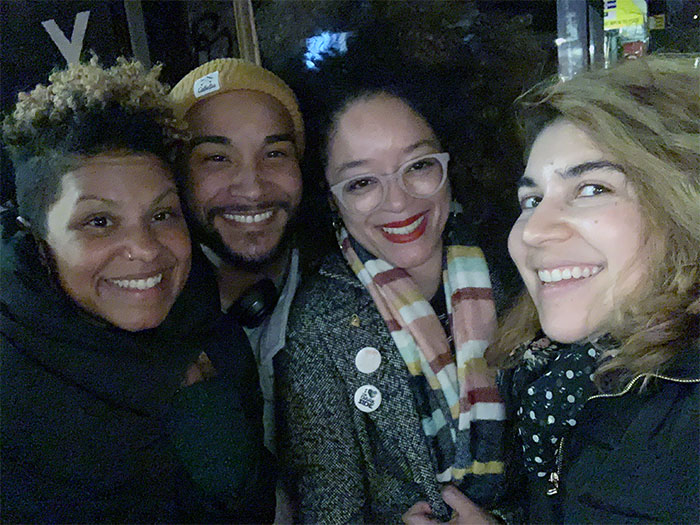We Are A Crowd

by Flosha “Flow” Tejada ’11
Joyce “Momma B” Bylander (who recently retired as Dickinson’s vice president for student life) taught me an incredible lesson during our First-Year Seminar titled Shared Futures, and it is a lesson that has withstood the test of time. Perfectly summarized by Barbara Kingsolver (one of Momma B’s favorite authors) in Small Wonders, “WE are a crowd.”
Kingsolver writes:
“Who says it’s ridiculous to imagine that the world could be made better than it is. When I come down to this feeling that I am an army of one standing out on the broad plain waving my little flag of hope, I call up a friend or two and offer to make dinner for us. We remind ourselves that we aren’t standing apart from the crowd, WE are a crowd. We’re a prairie fire, a church choir, a major note in the American chord.”
I didn’t fully grasp what that meant until just recently.
As with many of us, weaved into the fabric of my post-Dickinson experience is an incredible network of people who I prefer to call family. We’re a melting pot, and on occasion I forget this. On some “adulting” days, I imagine that I am alone in my hope for a better world, when suddenly one of the members of my family tribe emerges in the form of a text message, a Facebook post or a dinner invitation. Some of us met a few months before our first-year Orientation through our Posse Foundation weekly training meetings at 14 Wall St., while others bonded for life over passionate Feminist Collective discussions on campus safety, misogyny or simply who would cook at the next “Sinners’ Dinner.”
Yup, we hosted dinners in each other’s dorms.
Yes, we called them “Sinners’ Dinners” for fun.
When counseling students to find the “right fit” college, I am often asked where I went to school and why I chose to go there. My response confuses some of my parents and students: “I didn’t choose my undergraduate institution—it chose me.” As a first-generation, immigrant, native Spanish speaker, low-income, queer woman from NYC, choice wasn’t something I was very familiar with throughout my life. At Dickinson, Professor Jerry Philogene taught me the language to identify my exact emotions, helping me to realize I wasn’t alone in that sentiment.
So many of us went through those four years feeling alone in our alienation, experiencing dismay in our own silos, losing hope, and we may still be there today. People like me, people like us, aren’t necessarily welcomed in this country. As cliché as this may sound, friends are the family we chose for ourselves, and choosing my Dickinson family was one of the first true decisions I was ever empowered to make. Choosing Bush, Jeyla, Ashley, JB, Nick and Johnny (and many others) challenged me to put my money where my mouth is every day and to live up to what we preached, to really embody Dickinson’s motto of “a useful education” by putting into practice the intersectional perspectives, ideas and feelings we mulled over and turning it all into action.
Today, I passionately leverage my network of incredible Dickinsonians every day, and I encourage you to do the same. Bask in the trueness that “we aren’t standing apart from the crowd, WE are a crowd.”
In November, we celebrated our seventh annual Friendsgiving, and in more ways than one this is a continuation of our “Sinners’ Dinners” (minus a handful of “sinners”)—a revival of the Feminist Collective discussions that ignited action and the fruition of the most important lesson I learned from that Shared Futures seminar: Never lose hope.
Flosha “Flow” Tejada ’11 is director of college completion at Uncommon Collegiate Charter School in Brooklyn, N.Y. Born in the Dominican Republic, a native New Yorker and current resident of New Jersey, she came to Dickinson through the Posse Scholars program. She majored in American studies and studied abroad in England, as well as South Africa and Mississippi via Dickinson’s Black Liberation Mosaic.
Read more from the winter 2019 issue of Dickinson Magazine.
TAKE THE NEXT STEPS
Published February 14, 2019